
This is the Friday website review where I take a look at a random retail jewelry store website and dissect it to discover all the good and bad things we can all learn from.
For today's review, I started with a search for "jewelry stores in Kennebunkport, Maine" and was given this Google SERP result:
 VIEW FULL GOLD NUGGET
VIEW FULL GOLD NUGGET
Google has incorporated a massive dictionary into their functionality. After years of watching users, they were able to take that dictionary and create an automatic spelling correction feature called "Did You Mean."
The "Did you mean" feature showed up in November 2008, and it has a profound impact on SEO. Let's investigate why...
Whenever Google recognizes what it decides may be a misspelling, it will not return search results for that misspelling, instead it will correct the spelling and display a message saying "Showing results for {corrected spelling}. Search instead for {incorrect spelling}." This is a failsafe in case you really were searching for something with that incorrect (read: unpopular) spelling.
Prior to this automatic spelling correction, it was important to include misspellings on your website just...
VIEW FULL GOLD NUGGET
The internet gets larger every day. No one knows exactly how much larger every day. In July 2008, Google estimated the web grows by several billion pages per day. Of course that was before the Twitter and Facebook craze. Every Facebook post and every Tweet is its own page on the internet.
Daunting, isn't it?
When it comes to adding pages to the internet Google has one request above all others: "Add new value to the internet."
Of course, with billions of pages added every day how can YOU add value that someone else hasn't already done?
This is a good question, and we don't really have an iron clad answer. After all, how many different ways can you write about the 4C's of Diamonds? How many different ways can you explain what pearl restringing is?
Regardless, whatever you put on your website needs to...
VIEW FULL GOLD NUGGET

 VIEW FULL GOLD NUGGET
VIEW FULL GOLD NUGGET







